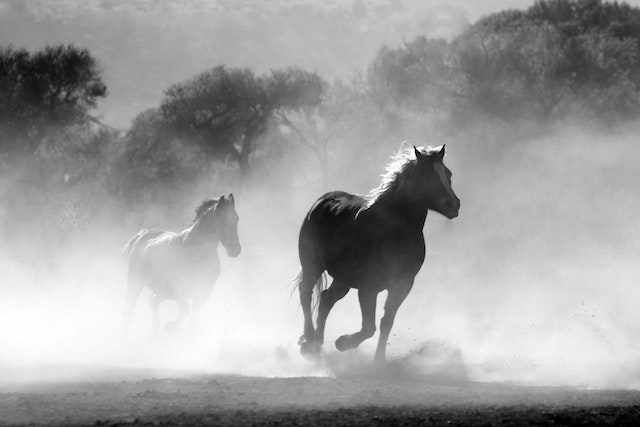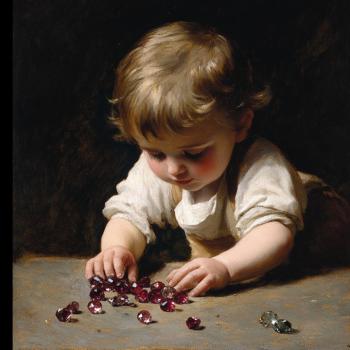The first part of this saying is, like the second half, familiar to those of us who have read the teachings of Jesus found in the Synoptic Gospels. Jesus begins here by pointing out that none of us can do two things at the same time. But, in this case, Jesus adds to the “No man serve two masters” statement by changing “man” to “slave” and adding two more examples: Riding two horses at once, and drawing two bows at the same time. This is a significant variation. Because while it is easy to see why no slave could serve two masters due to the nature of ownership and the conflicting desires of those different owners, it is not the same as the challenge we face when trying to do one thing twice.
In other words, it’s not hard for a person to ride or mount a horse. But it is physically impossible for anyone to ride two horses at once. Drawing a single bow may be difficult, but drawing two bows at once would be impractical and unnecessarily challenging; not to mention pointless.
So, why does Jesus do this? Why does he provide these additional examples for us to ponder in addition to the idea of serving two masters?
Our borrowed insight on this passage from the New Testament texts suggests to us that the idea is to illustrate how we cannot serve God and Satan – or Christ and the World – at the same time. Obviously, because those two “masters” are not going in the same direction and they are not compatible with one another. Therefore, Jesus must be trying to warn us that we need to choose our master wisely and not become worldly in our thinking or actions.
Perhaps this is all that is in view. But, when we examine the two other analogies we see that they are not quite in the same category. Riding two horses is not impossible for the same reason that obeying two masters is. No one can – or would ever seriously attempt – to ride two horses at the same time. What would be the point? And none of us would think of drawing two bows at once other than to see if it could be done, perhaps on a dare from a friend. But we would never draw two bows at once if we were attempting to hit the target with any semblance of accuracy or to hunt for game with any hope of success. It just wouldn’t make any sense.
Perhaps that is all that Jesus wants us to glean from these analogies: Doing two things at once is foolish and impractical. Pick one thing and to that. Ride one horse. Draw a single bow and arrow. Serve only one master. But, to be quite honest, no one listening to Jesus ever tried to do any of things. Neither have any of us. I mean, have you ever tried driving two cars at once? Probably not. And none of those listening to Jesus had ever tried to ride two horses or use two bows, or to pledge themselves as a slave to two different people. It just wouldn’t ever happen. So, maybe Jesus is simply pointing out the obvious. Maybe the lesson is simply to do the one thing and not be “double-minded.”
In the second half of this saying we have another example of something we’re familiar with from the Synoptic texts but with some slight variations. Still, most of us cannot possibly imagine any other way of understanding the second half of this saying apart from the framework borrowed from the sayings found in Matthew 6:24; 9:16, Luke 5:36; 16:3, and Mark 2:21. We read it and assume that the statements about new wine and vintage wine must be suggesting what we already believe it to say regarding the incompatibility of comprehending new ideas from within an ancient perspective. That is certainly one way to read this saying from Thomas, and it wouldn’t be necessarily inconsistent with the other sayings we’ve read so far in this Gospel. But, if we take what we’ve learned from Jesus thus far and apply it to the language used, we may discover something surprisingly new is going on.
To be sure, this saying in the Gospels of Mark, Matthew and Luke is presented in terms of equating the “new” teachings of Christ with the “old” ways of the Pharisees. Or, it may be understood as the end of the Old Covenant system and the emergence of the New Covenant reality. Either way, the “new” is essentially “good” in those New Testament texts and the “old” is what is “bad” and needs to be replaced by the new. Fair enough.
But, here in Thomas, this saying does not carry the same new/good – old/bad connotation. Notice that the saying merely points out the incompatible nature of the vintage wine – the way it tastes, the way it’s stored – and the new wine which requires appropriate means of storage and offers a different [but not necessarily bad] flavor palette. If anything, in Thomas, Jesus seems to favor the vintage wine when he observes that “no person drinks vintage wine and immediately desires to drink new wine.” So, the old/vintage wine has a more appealing flavor than the new. Does that mean the old is better? Is that what Jesus wants us to understand?
On one level, I think we can all see the practical logic of the examples Jesus offers. We can’t ride two horses at once. A slave can’t belong to two different masters. Vintage wine needs to be stored in old wineskins or they will spoil. New wine can’t be poured into previously-used wineskins or it will burst. You can’t sew an old patch onto a new garment. Got it. Sounds like Jesus is channeling Martha Stewart or Rachel Ray, doesn’t it? Okay, then. What’s the point here?
Well, if we keep in mind that everything Jesus says in Thomas is intended to help us snap out of the dualistic mindset and awaken from the illusion of separation, things start to take on another meaning.
For example, if we accept that what Jesus has told us up to this point in Thomas is that there is no male/female, black/white, rich/poor, us/them distinction, then how are we to understand his statements about riding two horses or pulling two bows, or serving two masters? What are we to make of Jesus saying we have to treat the “new” differently than the “old” or that some prefer the vintage to the fresh wine? Are these distinctions – these separations of new/old, good master/bad master – to be taken at face value? What if we could rethink these categories of new wine and old wine? What if the reason you can’t serve two masters is because you still see two separate masters? What if the reason you can’t ride two horses is because you think one horse is separate from the other horse? What if you can’t mix new wine and old wine because you fail to see that – whether old or new – they are both exactly the same substance: wine?
Now, I’m not saying this is the meaning. Perhaps it really is as simple and obvious as it seems. Jesus merely wants us to recognize the importance of doing one thing and not being distracted by other things. He wants us to consider the subtle differences between old wine and new wine, and not to mix old patched with new garments. Maybe that’s all there is to this.
Maybe. But, I can’t help but wonder, in a collection of sayings where Jesus instructs us over and over again not to become deceived by the illusion of separation and the allure of this/that and us/them ways of thinking, that perhaps this is yet another example of his attempt to get us to awaken to the oneness of all things.
What do you think?
**
Keith Giles is the best-selling author of the Jesus Un series. He has appeared on CNN, USA Today, BuzzFeed, and John Fugelsang’s “Tell Me Everything.” His latest book, SOLA MYSTERIUM: Celebrating the Beautiful Uncertainty of Everything is available now on Amazon in paperback and on Kindle.














